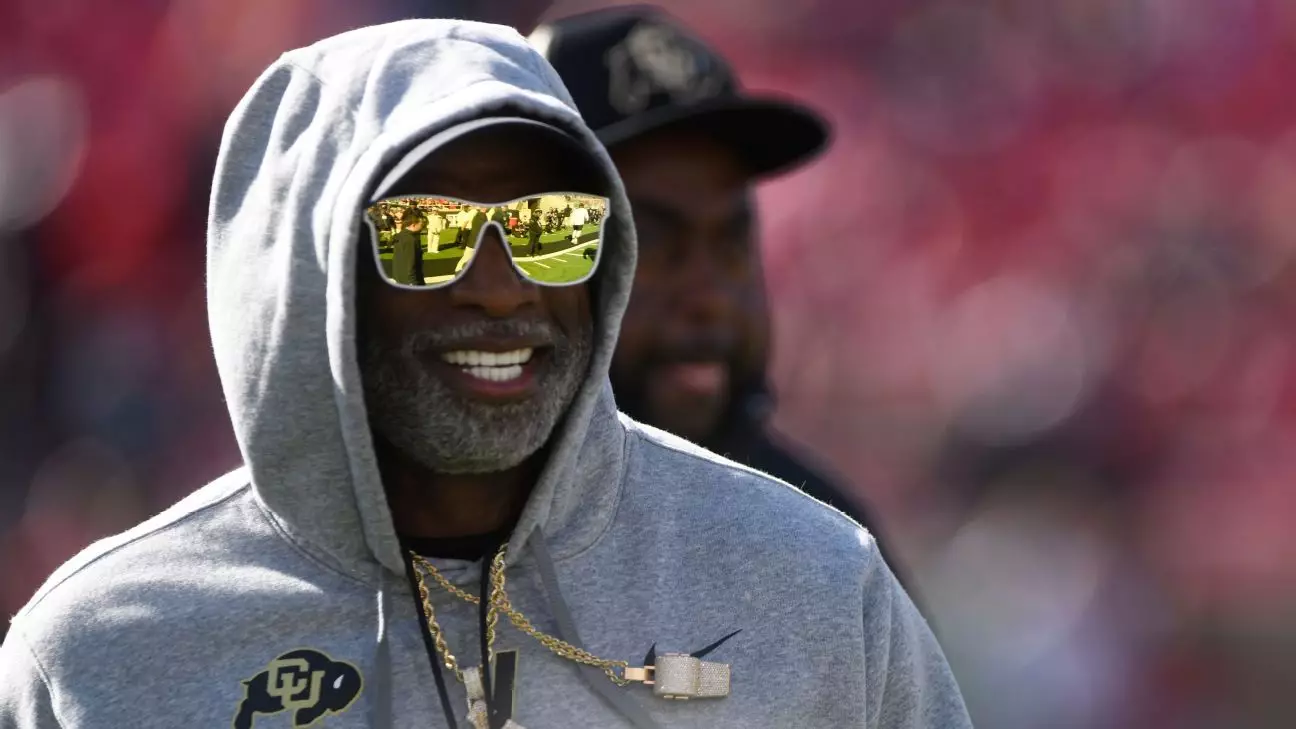Deion Sanders, affectionately known as Coach Prime, has taken the college football world by storm. His recent contract extension with the University of Colorado, worth a staggering $54 million over five years, cements his position as one of the highest-paid coaches in the nation. Beyond the dollar signs, this deal signifies a transformative shift not just for Sanders, but for the entire landscape of college athletics. In an era where individualism often clashes with tradition, Sanders embodies the audacity and the promise of a new generation of coaches.
One can’t help but be struck by the fact that Sanders inherits a program that was floundering, finishing a dismal 1-11 in 2022. Yet in a remarkably short time, he led the Buffaloes to 13 wins, proving that radical change is possible. His impact extends far beyond the field, capturing an unprecedented audience of over 54 million viewers throughout the 2024 season. This massive viewership isn’t merely a product of curiosity; it reflects a cultural phenomenon where fans are not just supporting a team, but embracing a movement.
Is It Just About the Money?
While Sanders’ potential salary of $12 million in 2029 is hard to overlook, it raises pressing questions about the commercialization of college sports. Is this financial commitment simply a reward for on-field performance, or could it signify the corrosiveness of capitalism infiltrating sports? Sanders’ popularity undoubtedly drives financial growth, yet the question remains: Are educational institutions primarily focused on cultivating young talent, or are they leaning increasingly toward profit maximization?
Moreover, Sanders has set a precedent by tying his success to the socioeconomic fabric of the university and its community. The reported 20% increase in applications—from prospective students seeking a reputation for excellence—underscores the intertwining of sports and educational pursuit. Yet, as the university revels in these statistics, one must ponder whether this is genuinely beneficial or just a temporary illusion benefiting institutional coffers.
Changing Lives, Not Just Records
When Sanders expresses his commitment to developing young men “who are ready to take on the world,” it resonates beyond the football field. Unlike many predecessors, his focus is not solely about the scoreboard; it’s about instilling values and life skills into athletes—an admirable mission. But let’s be frank; does this idealism change the underlying structures that often exploit young athletes? The NCAA currently grapples with whether the focus should be on education or financial gain. So, while Sanders searches for a five-bedroom house for his family, we must ask ourselves: Are we providing homes for aspiring athletes or merely commodifying their talents?
The increase in applications from Black and non-white students by over 50% hints at a broader cultural awakening—a moment in time when young people seek representation and opportunities. But does Sanders’ presence effectively dismantle the systemic barriers in education and sports, or is it more of a fleeting trend that may not alter the institutional status quo?
The Economic Impact of Success
Colorado’s financial gain from Sanders’ leadership is astonishing; a combined economic impact of nearly $150 million is noteworthy. However, we must critically consider if this inflow of dollars is truly a testament to good leadership or rather a byproduct of the spectacular spectacle that Sanders brings. Are we valuing players and programs based on marketability rather than merit?
Rick George, the athletic director, touts Sanders as a revolutionizer of college football, yet we should be wary of glorifying any single individual as the savior of a deeply flawed system. The nexus of athletic prowess and commercial success complicates our relationships with sports; should priority be given to the players or the profits?
In a world yearning for authenticity amid overwhelming commercialization, Coach Prime is undeniably a magnetic figure. But as we celebrate his achievements and await what’s next in this unfolding story, we must keep our eyes open, critically considering what this all means for the broader narrative of college athletics and the souls it’s meant to uplift.

